Drowning in an endless wave of emails? Dealing with a muddled inbox?
Achieving inbox zero — an email management approach aimed at keeping your inbox as empty and clutter-free as possible at all times to improve productivity and focus — is getting more and more difficult in our hyper-connected era where every update, promotion, or important message is communicated via email.
But it doesn’t have to be that way.
With recent advances in artificial intelligence and natural language processing, you can now have an AI email assistant that takes care of pretty much everything — from drafting quick replies to cleaning up unnecessary junk — making inbox management a breeze and freeing your time for what truly matters.
In this guide, we dive into our handpicked list of the best AI email assistants available today and show you how to pick the right one for your needs. We also reached out to a few industry leaders to get their insights on how AI is influencing the email realm and what factors you should consider when deciding on an AI email assistant.
Before we get into finding the best AI email assistant app for your needs, first, let's take a look at the crucial role of AI in elevating email management.
How AI is Upgrading the Email Experience As We Know It
Your traditional email experience is riddled with inefficiencies and issues, such as:
- Overwhelming Volume: You often face a flood of messages (most of which are unimportant) daily, making it hard to prioritize or even access important communications.
- Time Consumption: You waste significant time managing, sorting, and replying to emails that could be automated.
- Security Vulnerabilities: Phishing and other malicious attacks frequently target your inbox, posing continuous threats.
- Poor Organization: Your emails from various sources can easily become disorganized, leading to missed messages, important updates, and opportunities.
- Lack of Integration: Your email system lacks easy integration with other productivity tools, hindering efficient workflow management.
- Manual Unsubscribing: You must manually unsubscribe from unwanted promotional emails, which is time-consuming and tedious.
- Incorrect Categorization: Important emails are sometimes mislabeled as spam, while spam can flood your primary inbox, leading to confusion and missed communications.
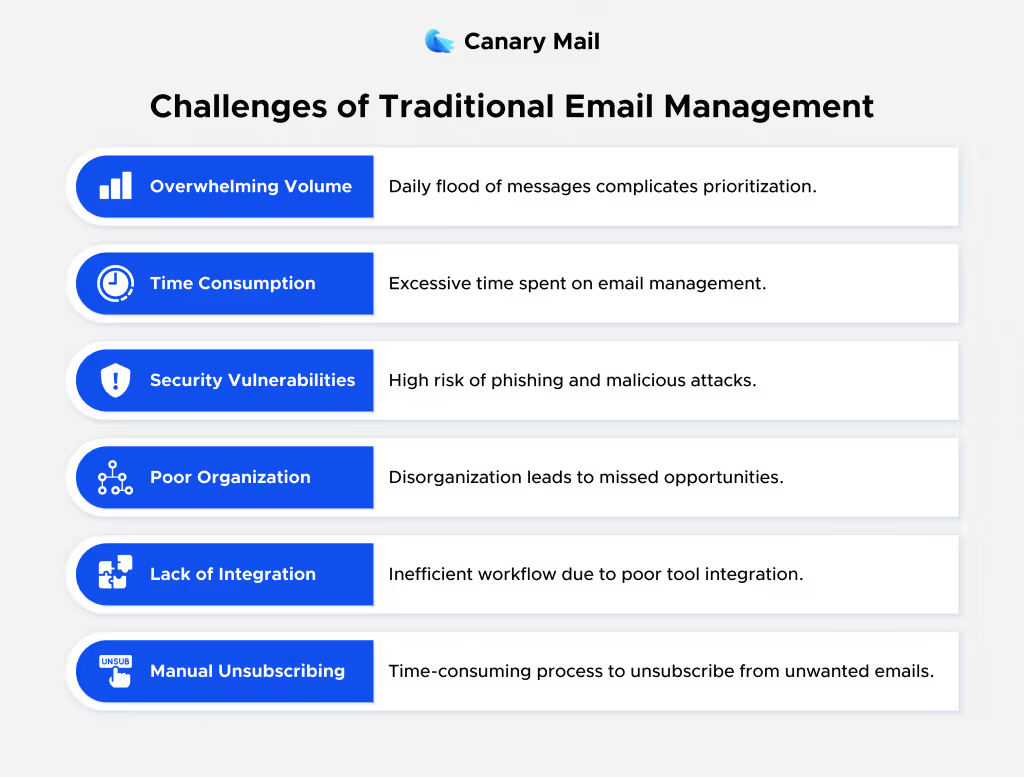
These issues underscore the need for a dedicated solution like AI email assistants.
And guess what?
AI in email is already here and very much capable of tackling all these issues.
Recent surveys back this up:
- 75% of professionals use AI for email and task automation.
- 61% of companies use AI to optimize their emails.
- 51% of US and EU email marketers believe that AI-powered email marketing is more effective than traditional email marketing.
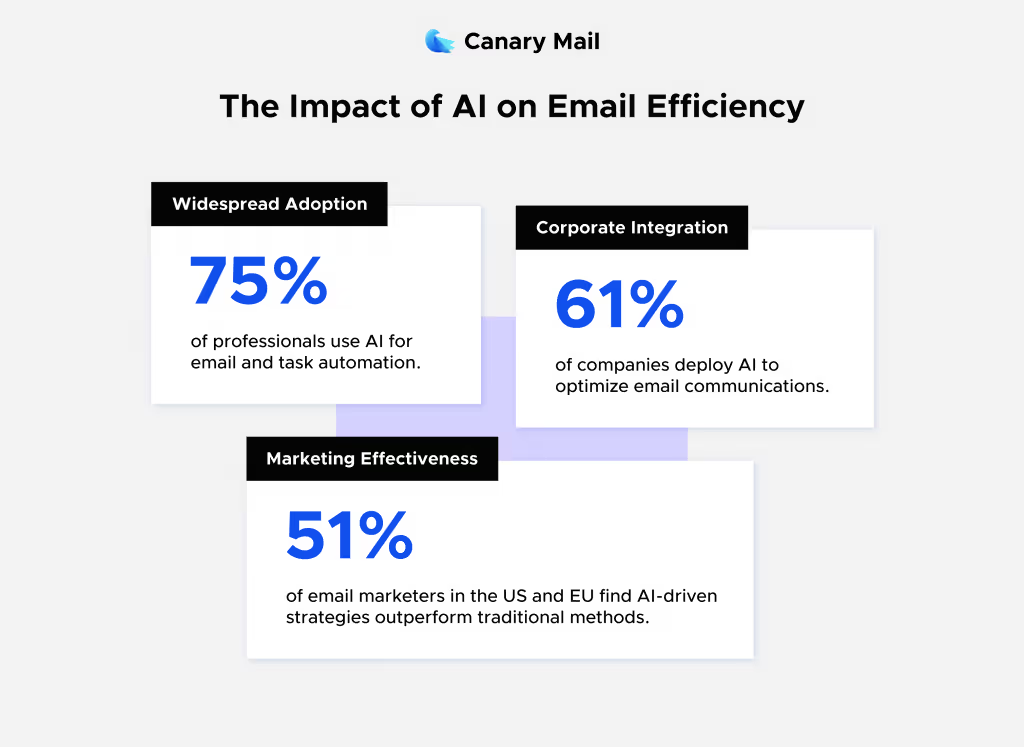
Some of the biggest players in the email industry agree.
“AI is going to make email so much easier and more effective, especially for marketers. Imagine emails that hit the right spot every time. AI can learn everything about your subscribers—what they like, when they’re most likely to respond—and help companies send the perfect message at the perfect time,” says Oleksii Ianchuk, Product Lead at Mailtrap.
“Honestly, it’s already doing so much of this! What’s left is to make those letters feel more thoughtful and personal. For individual users, AI can help with everything from writing great emails to decluttering spam and letting people focus on what really matters in their inboxes,” he adds.
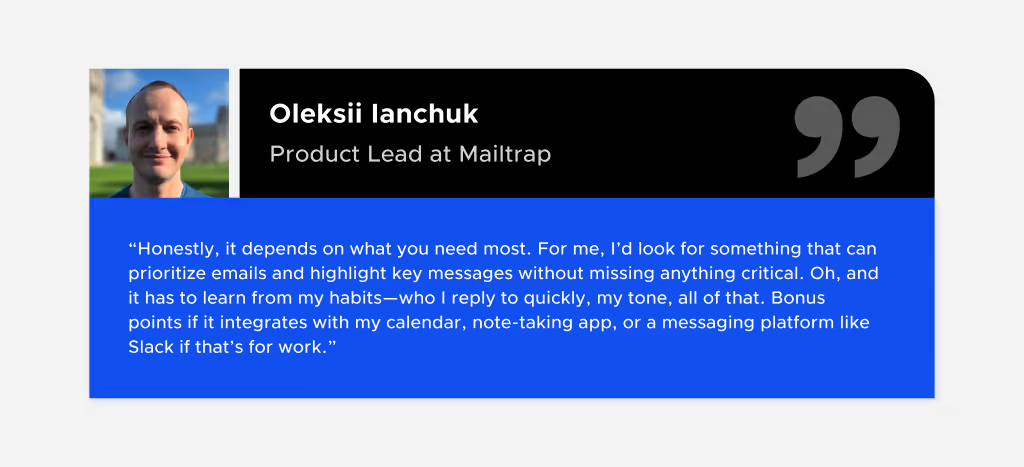
“AI is set to make a considerable impact on email by making it faster and more efficient. AI can streamline complex and formal interactions, significantly reducing the time required to address elaborate or nuanced situations. Additionally, it broadens the scope of customer engagement, particularly for organizations or departments that rely solely on email and do not provide alternative channels like live chat. By automating responses, prioritizing urgent queries, and offering tailored interactions, AI has the potential to revolutionize how businesses and individuals manage their email communications,” notes Andre Braga, Senior Product Manager at Tidio.
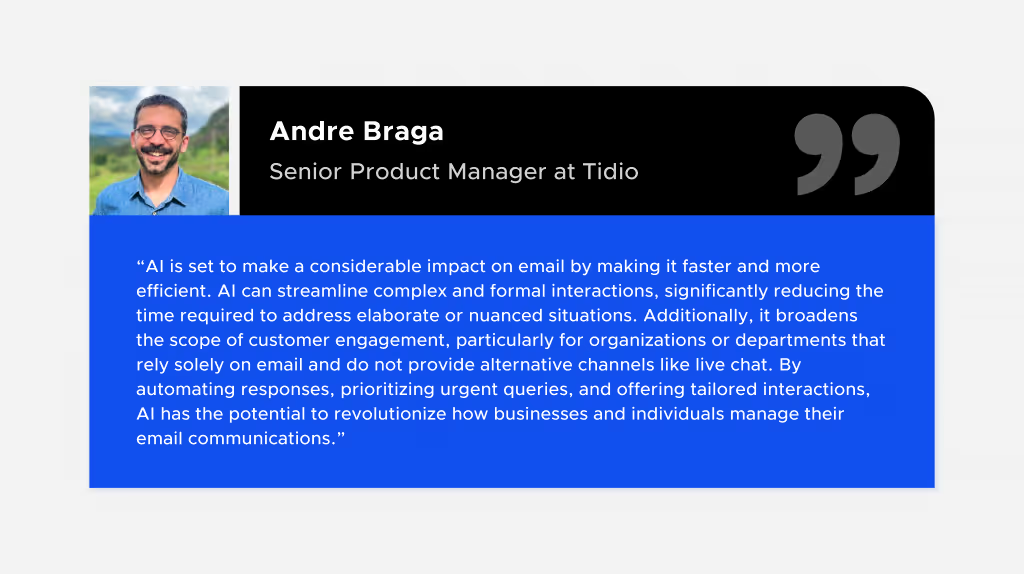
Dmytro Kudrenko, the Founder and CEO of Stripo, explains where email is heading in terms of both general productivity boosts as well as in terms of marketing nuances.
“I closely follow the rapid development of AI assistants and see two primary directions reshaping the market. The first is AI assistants designed to optimize time in business and sales correspondence. Here, personalization and maintaining the context of previous interactions are critical. These technologies not only accelerate the process of crafting emails but also make them more relevant to recipients, significantly enhancing communication efficiency,” suggests Dmytro.
“The second direction focuses on AI assistants for creating marketing emails. This is a more complex challenge, involving the development of intricate designs, maintaining brand identity, producing creatives, and tailoring content for audience segmentation. These emails must not only be visually appealing but also meet technical standards and drive business goals effectively,” he adds.
Dmytro also illuminates the need for AI to go beyond basic automation and adapt to the specialized needs of different organizations.
“A growing challenge for both types of AI assistants lies in enriching context, improving data quality, and building tools to control and refine AI performance. The most effective strategy is the development of specialized AI agents that go beyond automation, learning and adapting to the unique needs of specific businesses. AI in email communication is no longer just about automation; it’s about delivering personalized, relevant, and impactful messages. At Stripo, we remain committed to advancing solutions that empower our clients to stay ahead in this technological race, ensuring their email campaigns achieve both creativity and efficiency,” states Dmytro.
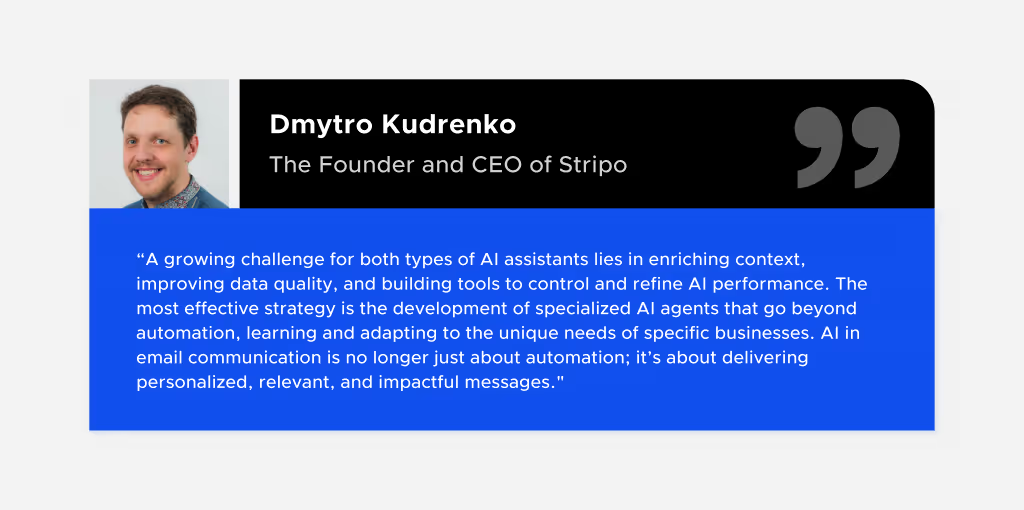
Put simply, AI is significantly impacting the realm of email, enhancing both personal and business communications. It promises enhanced productivity, better security, and a more organized approach to handling the influx of daily communications:
- Enhanced Productivity and Time Management: AI email assistants streamline the process of sorting and responding to emails by learning user preferences and behavior. This leads to faster, more efficient email handling, freeing up time for other tasks.
- Improved Email Security and Privacy: By using sophisticated machine learning algorithms to analyze patterns, AI can detect anomalies that may indicate phishing attempts or other security threats. Also, these tools ensure that sensitive information is handled with the utmost confidentiality and compliance with data protection laws.
- Reduction in Email Overload: AI helps automatically categorize and even archive unnecessary emails. By prioritizing important messages and filtering out spam or less urgent emails, AI assists you in maintaining a cleaner, more manageable inbox.
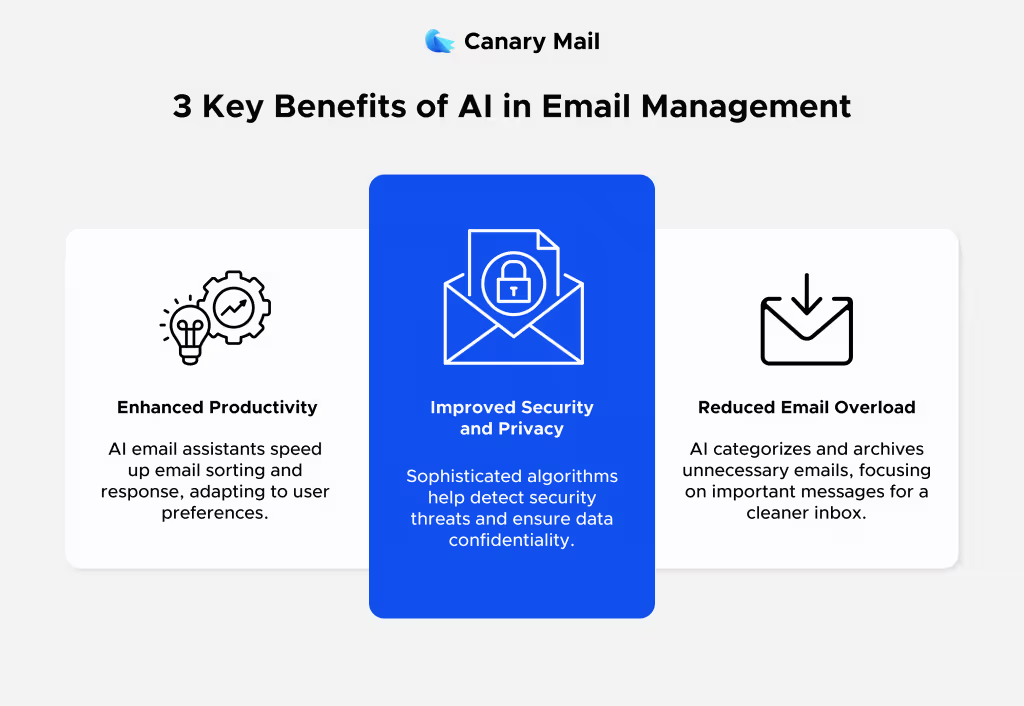
So, while AI is not yet fully integrated into email workflows ubiquitously, it has already become integral to emails and is becoming increasingly integral as we speak. (Ergo, here you are, seeking the best AI email assistant app.)
“I’ll caveat this by saying we’re not ‘there’ yet. But AI is already a daily part of email’s life. You see it in the algorithms around deliverability. You see it dynamic content and dynamic segmentation. You see it in ‘next best channel’ decisioning around whether to send email+SMS+Push, or just email, etc. These things that now fall under the mantle of ‘AI’ have actually been around in email for quite some time,” says Scott Cohen, CEO at InboxArmy.
“What the push toward AI is doing for email is making the ‘speed to market’ for testing, iteration, dynamic content, and other components getting faster and easier. Email marketers will be able to test more ideas faster and glean learnings faster. I’m not one to think AI will fully replace the humans and EQ required to take the hands fully off the AI wheel. But it will enhance productivity when leveraged correctly,” he adds.
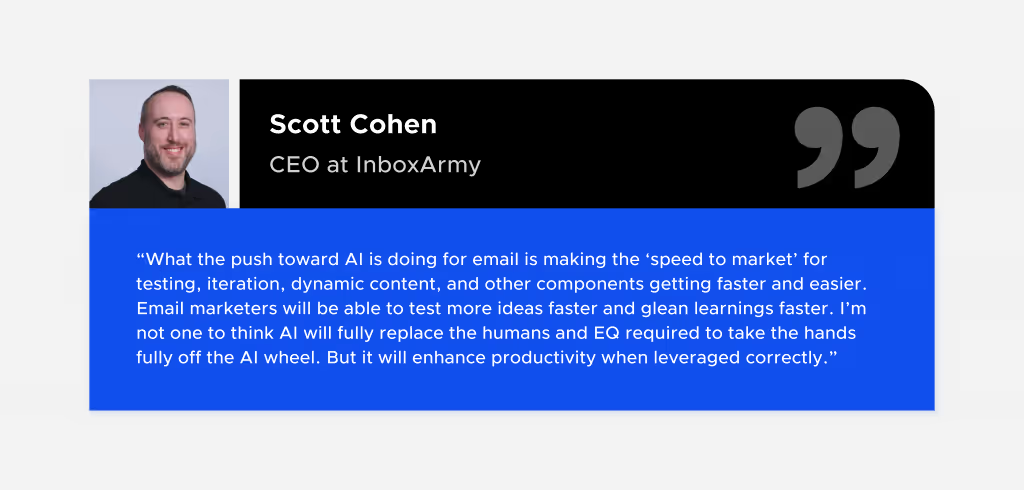
Overall, through these enhancements (and a lot more, such as drafting emails, sentiment analysis, etc., which we’ll cover later), AI is not only upgrading the functionality of email systems but also ensuring that email management becomes a near-effortless activity.
So, the question is: which are the best AI email assistants available right now? Also, what are the different aspects of email they help with based on your needs?
Let’s get into it.
Best AI Email Assistant: All the Great Options Available Today
We scoured the internet to curate this list of the best AI email assistants in 2024. Some help you write email copy, some help with inbox management, and some do it all.
Now, let’s check them out in more detail.
1. Canary Mail: The Best AI Email Assistant for Individuals and Teams

Canary Mail is designed to redefine your email experience with powerful AI-driven features that enhance both efficiency and security. It offers a streamlined, intuitive interface that supports individual users and teams alike.
Canary is not just an email client; it's a full-fledged AI email assistant that transforms your email workflows. With its robust focus on security, productivity, and user-centric design, Canary Mail offers a seamless experience that extends way beyond traditional email handling.
Admittedly, we’re a bit biased in listing Canary at the top. But if you remove the bias, we still have plenty of reasons to back up this ranking. Check out the capabilities of Canary below.
Key Features
- AI Copilot: Automatically manages and prioritizes emails, offering smart suggestions and actionable insights.
- Smart Summarization: Quickly understand the gist of long emails without reading every word, saving you time and effort.
- Focused Inbox: AI-driven insights help filter important emails, reducing noise and letting you focus on what matters.
- Privacy-First Architecture: Offers end-to-end PGP encryption right out of the box along with SecureSend, ensuring that your communications remain confidential.
- Easy Scheduling: Schedule emails to be sent at the perfect time and snooze non-urgent emails.
- Multi-Account Integration: Effortlessly manage multiple email accounts from different providers in a single unified inbox.
- Bulk Cleaner: Helps quickly clean up the inbox by deleting or archiving emails in bulk.
- Read Receipts and Email Tracking: Offers insights into when your emails are read and by whom.
- AI Email Writer: Assists you in drafting emails quickly by providing suggestions and completing sentences.
Pros
- Strong encryption practices secure all communications.
- Sleek and easy-to-navigate design enhances user experience.
- AI helps manage the inbox efficiently, reducing clutter and highlighting important emails.
- Features like shared inboxes and delegation tools make it a top choice for teams, improving collaboration and communication.
Cons
- The wealth of features translates into an initial learning curve.
- Some users may find the range of features overwhelming or unnecessary for their needs.
Pricing
There’s a free plan for basic personal use with core features. The Growth plan costs $3 per user/month (billed annually at $36), and includes AI Copilot features like composing and summarizing, along with advanced customization and scheduling. The Pro+ Plan costs $10 per user/month (billed annually at $100), and includes advanced collaboration tools and enhanced security features.
User Ratings
G2: 4.4/5 (49 reviews)
Capterra: 4.7/5 (3 reviews)
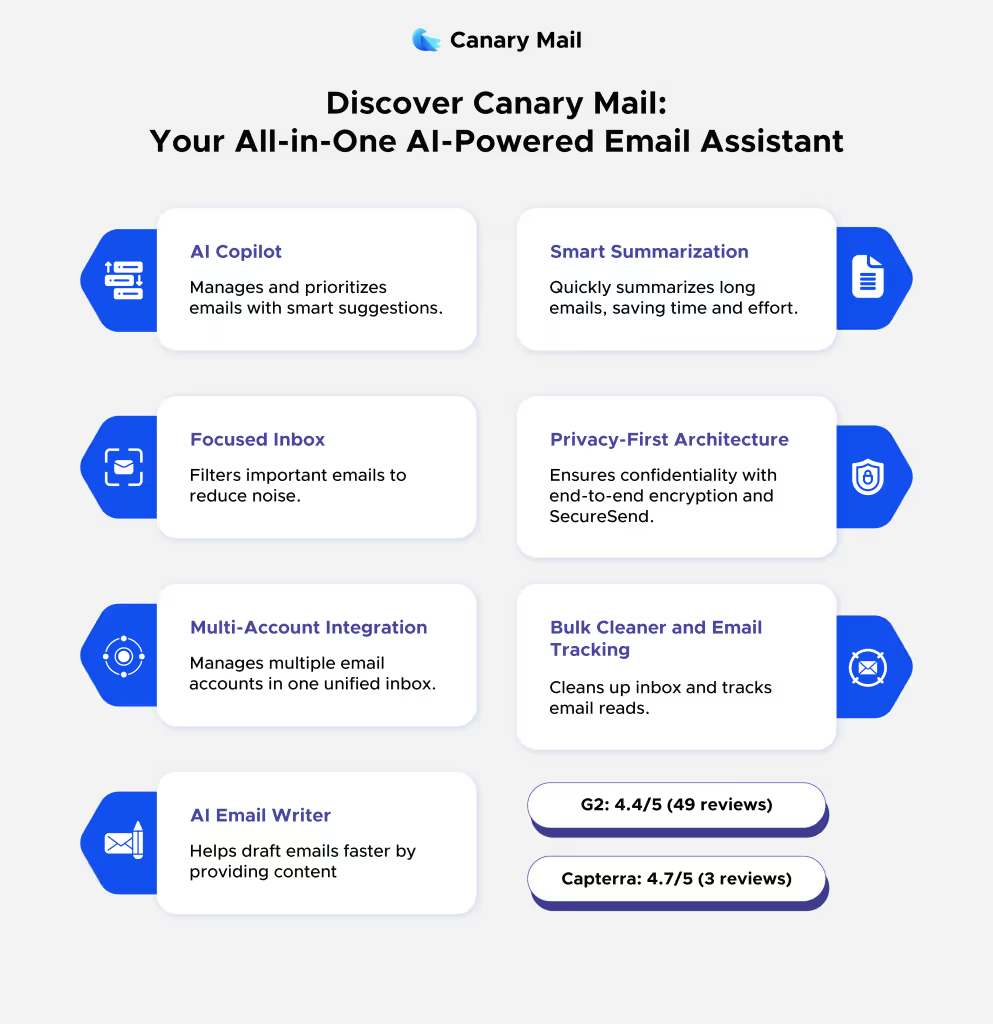
2. Superhuman: For Speed and Integration with Professional Tools
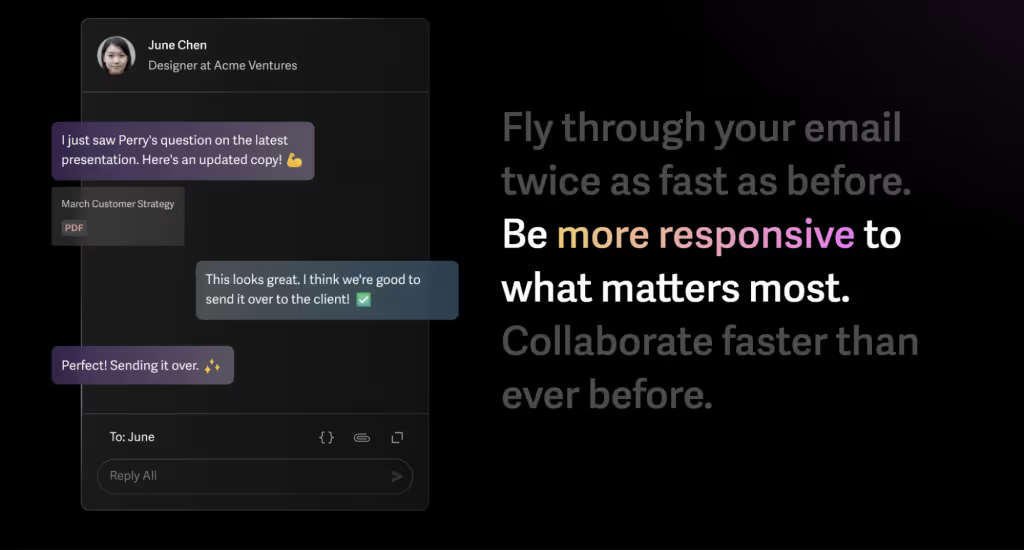
Superhuman is all about boosting productivity in email management, saving teams over 15 million hours annually by leveraging AI to streamline processes and enhance collaboration. It streamlines how you handle emails, with a core focus on cutting down the time spent on email management significantly.
Key Features
- AI-Enhanced Emailing: Features like AI-driven snippets allow for rapid composition by automating phrases and whole emails.
- High-Performance Modes: Includes a dark mode with multiple split inboxes to enhance focus and response times.
- Collaboration Tools: Real-time visibility into team responses to avoid overlap and enhance coordination.
- Send Later and Instant Reply: Optimizes timing for email responses, including options to snooze and schedule emails.
Pros
- Designed to save users four hours per week by optimizing email tasks.
- Offers tailored shortcuts and automation that adapt to user and team workflows.
Cons
- Premium cost which might not fit every budget.
- Only suitable for heavy email users and professionals, not ideal for casual users.
- Has a fairly steep learning curve due to advanced functionalities designed for power users and enterprises.
Pricing
Superhuman offers three pricing tiers for its email productivity tools. The Starter Plan is priced at $25 per user per month, targeting individuals and smaller teams with basic AI features. The Business Plan, at $33 per user per month, includes advanced integrations and personalized productivity coaching, ideal for professional teams. There's also an Enterprise Plan with custom pricing, offering advanced security and dedicated support for larger organizations.
User Ratings
G2: 4.7/5 (724 reviews)
Capterra: 4.9/5 (20 reviews)
3. Spark Mail: For Efficient Email Handling and Team Collaboration

Spark Mail positions itself as a smart, focused email solution designed to enhance productivity and minimize distractions. It emphasizes efficiency and organization, catering to both individual users and teams.
Key Features
- AI-Powered Assistance: Helps craft precise emails quickly and offers insights from email threads.
- Smart Inbox: Filters important emails and minimizes noise.
- Collaboration Tools: Facilitates team email management by allowing real-time collaboration on drafts and sharing of email snippets.
Pros
- Features like 'Snooze Emails' and 'Send Later' help manage time effectively.
- Data storage and encryption are secured through Google Cloud service.
- Streamlines email management with a clean, intuitive design.
Cons
- New users might need time to adapt to the comprehensive features.
- Some users may find the need for deeper integration with non-email tools.
- While helpful, the various alerts and reminders could become overwhelming.
Pricing
Spark Mail offers a tiered pricing structure to cater to both individuals and teams. The Free Access plan provides basic email management features at no cost. For more advanced tools aimed at enhancing focus, the Premium Individual plan is available for $4.99 per month or $59.99 annually. Teams seeking enhanced collaboration features can opt for the Premium Teams plan, priced at $6.99 per user per month or $83.88 annually.
User Ratings
G2: N/A
Capterra: N/A
4. Missive: For Integrated Communication Channels and Collaborative Email Management
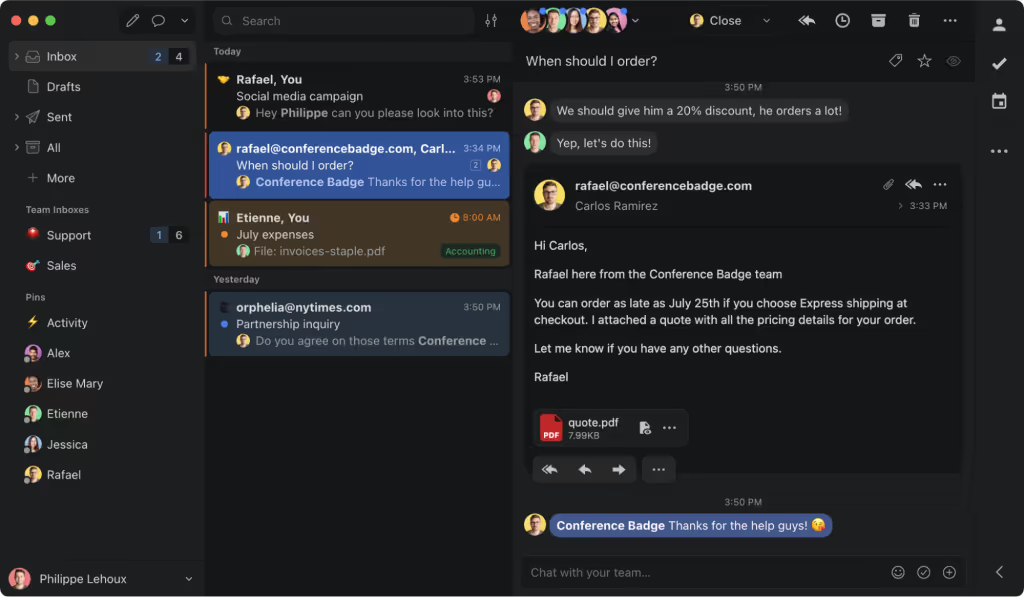
Missive transforms the traditional email experience into a collaborative hub, specifically designed for teams that manage multiple communication channels. It integrates email, SMS, live chat, and tasks within a single platform to streamline team workflows and enhance productivity.
By allowing real-time collaboration directly within emails and conversations, Missive supports a more integrated and responsive way to handle customer interactions, making it a powerful tool for teams in customer service, sales, and project management.
Key Features
- Unified Communication Channels: Integrates emails, SMS, and live chats in one app, enhancing team coordination.
- Collaborative Email Management: Enables real-time collaboration on emails and tasks within the app.
- Scoped Conversations: Ensures clarity and focus by organizing conversations around specific topics or projects.
Pros
- Always know who is working on what with transparent team workflows.
- Missive facilitates better coordination and faster decision-making among team members.
- Connects seamlessly with tools like ClickUp, Salesforce, and over 3,000 other apps to automate workflows.
Cons
- Not user-friendly, and might be overwhelming for smaller teams or those new to comprehensive collaboration tools.
- While basic features are accessible, more advanced features come at a higher price.
Pricing
Missive offers a tiered pricing structure tailored to different team sizes and needs. The Starter Plan is $14 per user per month, designed for small teams of up to 5 users. The Productive Plan, at $24 per user per month, caters to larger teams of up to 50 users with features like API access and automation. The Business Plan costs $36 per user per month, suitable for unlimited users with advanced options such as SAML single sign-on and IP restriction.
User Ratings
G2: 4.7/5 (242 reviews)
Capterra: 4.9/5 (90 reviews)
5. Clean Email: For Smart Inbox Cleanup and Organization
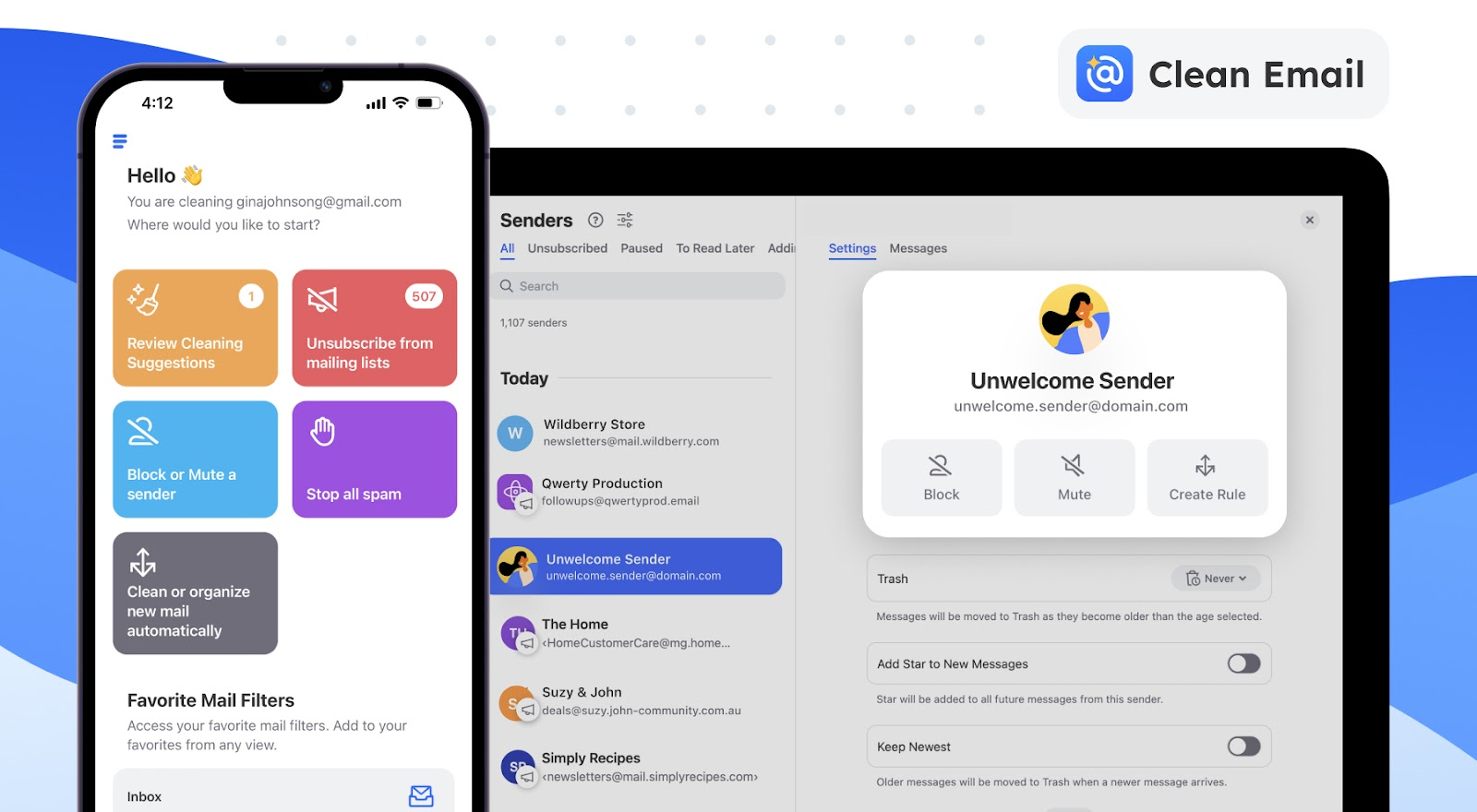
Clean Email focuses on one goal — clearing email clutter and keeping your inbox manageable. It is not technically an AI tool, but its advanced algorithms feel just as smart. The platform helps you bulk clean, organize, and automate email management without the complexity of AI chatbots or writing assistants.
Key Features
- Cleaning Suggestions: Learns from your choices and suggests the best ways to clear clutter.
- Auto Clean: Runs your rules in the background so your inbox stays tidy with no daily effort.
- Smart Folders: Groups emails into categories like Shopping, Seasonal Deals, and Finance for quick review.
Pros
- Simple, lightweight design that works with any email provider.
- Saves hours of manual email sorting every month.
- Cross-platform availability: web, iOS, Android, and Mac.
Cons
- Focused on inbox cleanup, not email writing or replies.
- No Windows desktop app.
Pricing
Clean Email offers a free trial to manage up to 1,000 emails. Subscriptions start at $9.99 per month or $29.99 per year for one account. Family and team plans are also available, supporting up to 10 accounts.
User Ratings
G2: 4.6/5
Capterra: 4.7/5
6. Mailbutler: For Productivity Tools in Major Email Clients
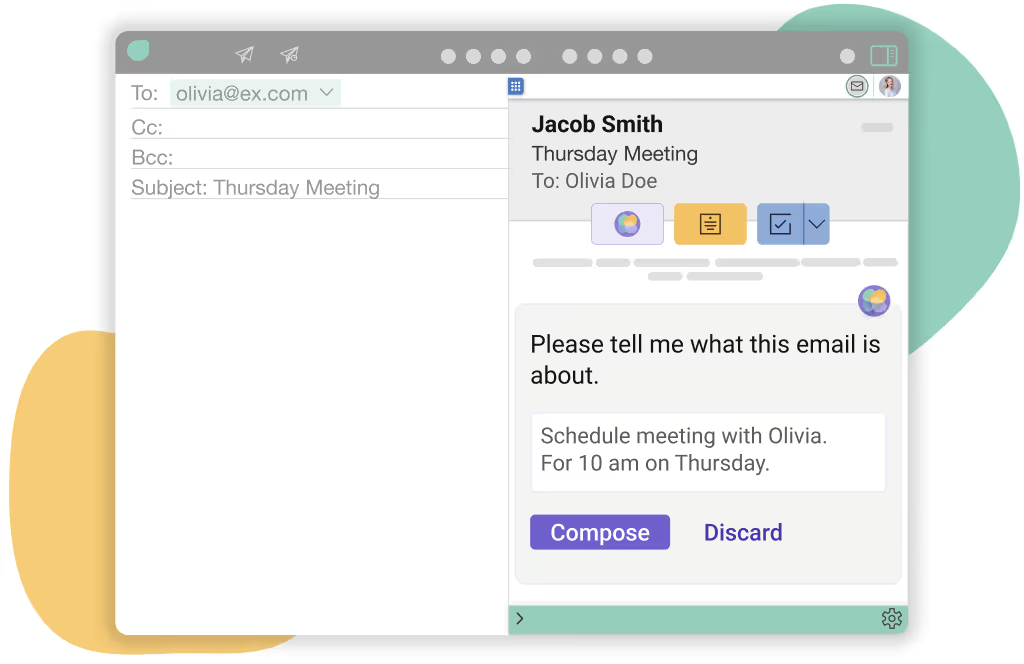
Mailbutler is a sophisticated email extension that supercharges your inbox with a suite of productivity tools. It integrates seamlessly with popular email clients (Apple Mail, Gmail, and Outlook inbox) to provide features that streamline email management, follow-up scheduling, and communication tracking.
Key Features
- Email Tracking: Understand when, where, and how your emails are opened.
- Smart Assistant: AI-powered assistant that aids in writing, responding, and summarizing emails.
- Snooze Emails: Manage your inbox by temporarily hiding less urgent emails.
- Email Templates and Signatures: Create and use customized templates and professional signatures effortlessly.
Pros
- Enhances productivity with tools for tracking, scheduling, and organizing.
- Works smoothly with major email clients, ensuring a broad user base.
- Compliant with stringent European data regulations, ensuring user data is protected.
Cons
- Premium features require an ongoing subscription, which may be a barrier for budget-conscious users.
- The extensive range of features can be overwhelming for users who prefer a simpler email experience.
- Some users report occasional bugs and glitches, especially during updates, which can disrupt workflow.
- While it integrates well with major clients, its performance and features might vary across different platforms.
Pricing
Mailbutler offers several subscription plans. The Tracking plan at $4.95 per month, the Professional plan at $8.95 per month, the Smart plan at $14.95 per month, and the Business plan at $32.95 per month, all billed annually. Each plan builds upon the previous, adding more sophisticated features like AI-powered assistance, advanced tracking, and team collaboration tools. A 14-day free trial is available for new users to explore the features.
User Ratings
G2: 4.4/5 (63 reviews)
Capterra: 4.8/5 (89 reviews)
7. SaneBox: For Simplifying Email Management and Decluttering
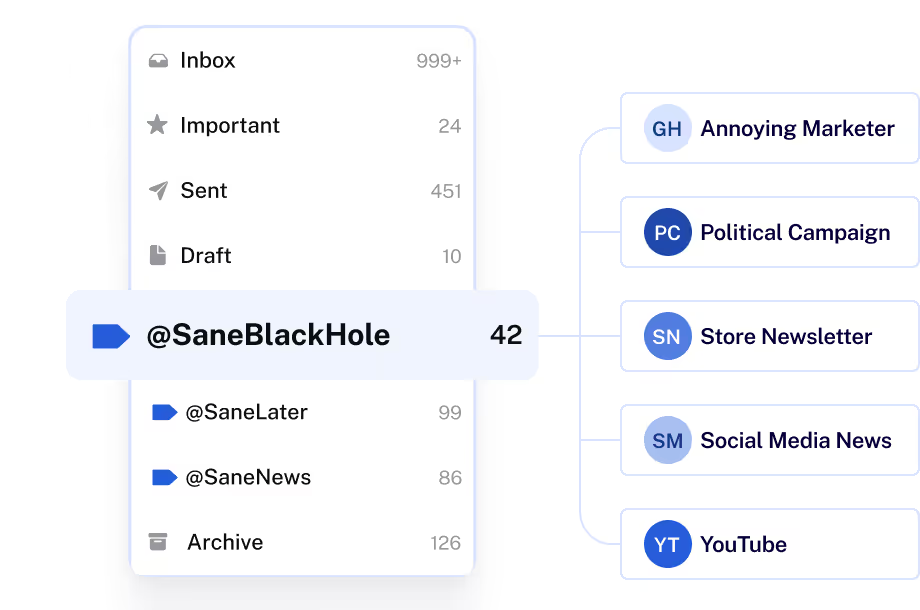
SaneBox is a powerful email management service that prioritizes your inbox by sorting emails based on their importance. Essentially, it wants to bring sanity back to your inbox by filtering out unimportant emails and summarizing the rest. It's designed to save users up to 3-4 hours per week, focusing on what truly matters and keeping distractions at bay.
Key Features
- Automatic Email Sorting: Uses sophisticated algorithms to filter emails into categories, ensuring important messages stand out.
- Snooze Function: Temporarily removes non-urgent emails from your inbox, allowing you to focus on immediate tasks.
- BlackHole: Easily unsubscribe from unwanted senders permanently with one click.
- Reminders and Follow-ups: Sets follow-up reminders for emails that require a response, ensuring nothing slips through the cracks.
Pros
- Reduces the time spent managing emails effectively.
- Offers a variety of tools and settings to tailor the experience to individual preferences.
- Works with every major email service and across all devices.
Cons
- Some important emails may be misclassified until the app adjusts to your preferences.
- Despite AI improvements, there's a risk of important emails being filtered incorrectly into lower-priority folders.
- Access to all features requires a paid subscription.
Pricing
SaneBox offers various pricing tiers based on feature sets and usage: the Snack plan at $7 per month (for one email account and any two features), the Lunch plan at $12 per month (for two email accounts with six features each), and the Dinner plan at $36 per month (for four email accounts with all features included), each billed annually. These plans cater to different levels of email management needs, from basic filtering to advanced features like response tracking and team collaboration tools.
User Ratings
G2: 4.9/5 (174 reviews)
Capterra: 4.8/5 (70 reviews)
8. Flowrite: For Automating Routine Communications
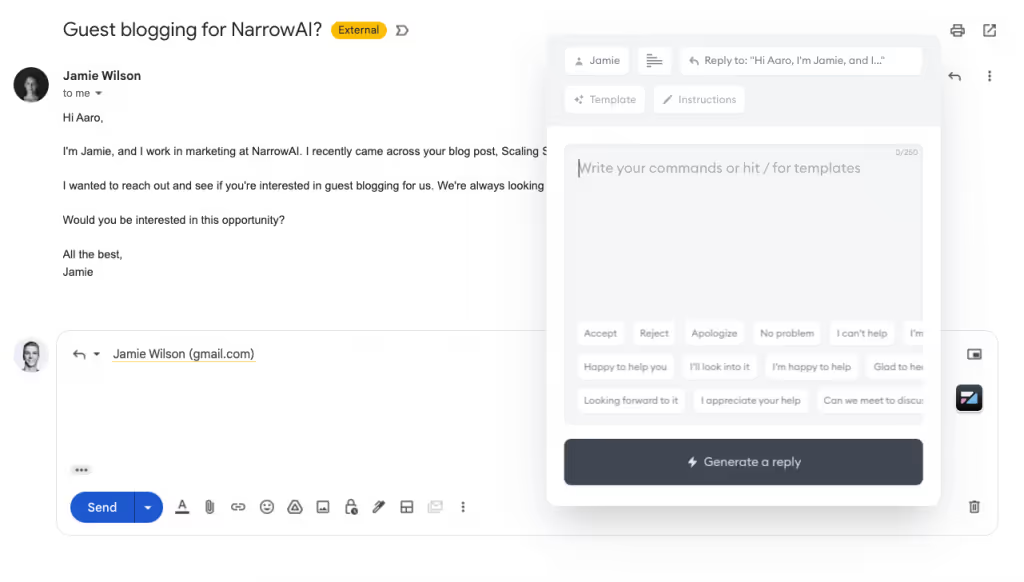
Flowrite by Flow AI is crafted to enhance your daily communication by converting concise inputs into fully formed emails and messages. It stands out as a sophisticated AI-powered writing assistant that integrates effortlessly across various applications, including email clients like Gmail and Outlook, and platforms like LinkedIn.
Key Features
- AI-Powered Email Drafting: Generates polished emails from brief bullet points or outlines.
- Wide Application Integration: Works seamlessly across over 20 apps, streamlining communication in various formats.
- Personalized Reply Suggestions: Offers multiple tailored response options, enhancing efficiency and personalization.
Pros
- Designed to save you hours each week by automating routine written communications.
- Adapts to your preferences and styles, making each communication personalized and relevant.
- Simple and intuitive, requiring minimal effort from you to create high-quality content.
Cons
- The effectiveness of the generated content heavily relies on the clarity and detail of the initial prompts.
- New users may need time to optimize their use of the tool to get the best results.
- Setting up and integrating across multiple platforms is a bit complex and time-consuming.
- The cost does not justify the benefits for users who only occasionally need advanced writing assistance.
Pricing
Flowrite offers a range of pricing plans, all starting with a 14-day free trial. The monthly plans include Light for $5 with 15 messages, Premium for $15 with 150 messages, and Unlimited for $30 with unlimited messages. The annual plans provide a discount, costing $4, $12, and $24 per month for the Light, Premium, and Unlimited plans, respectively. These annual rates reflect considerable savings over the monthly options.
User Ratings
G2: 4.5/5 (1 review)
Capterra: N/A
9. Copy.ai: For Streamlining Go-to-Market Operations
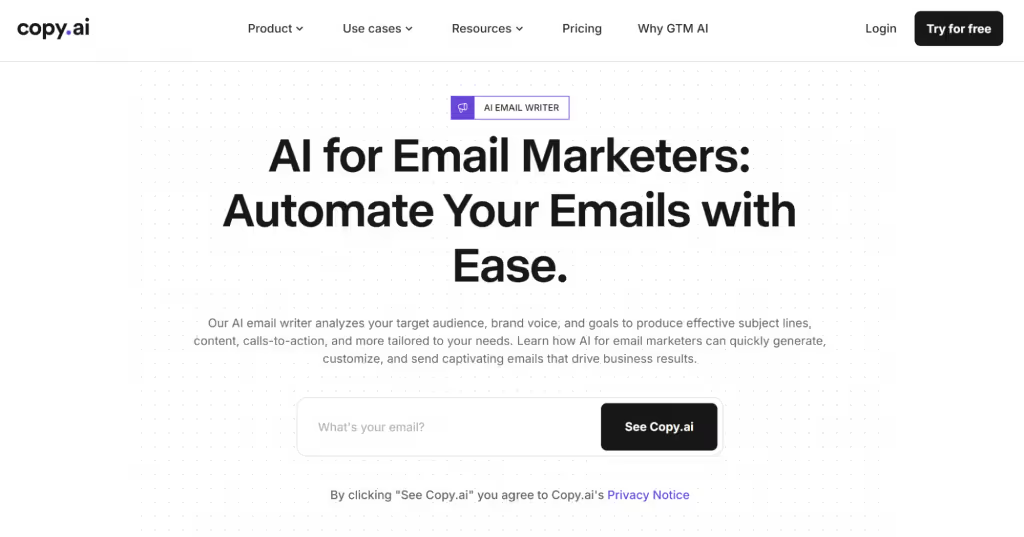
Copy.ai is a comprehensive AI-driven platform designed to enhance go-to-market (GTM) strategies. It offers tailored solutions for marketing and sales through its AI Marketing OS and AI Sales OS, automating content creation and optimizing sales processes.
It is designed to automate various aspects of digital content creation, including emails. It employs advanced AI to generate creative and effective copy rapidly, facilitating email communication and overall marketing efforts.
Key Features
- AI Marketing OS & AI Sales OS: Specialized operating systems for automating marketing and sales tasks.
- Diverse Content Generation: Capable of generating everything from ad copy to sales emails.
- Extensive Integration: Supports over 2,000 integrations, ensuring compatibility with various business systems.
Pros
- Provides fresh, creative ideas for content at scale.
- Drastically reduces the time required to produce email content.
- Particularly useful for email marketers, social media managers, and content creators.
Cons
- While you can use Copy.ai as a simple AI email writing assistant, the tool is geared toward GTM workflows.
- Too many features make it inefficient for individual use.
- The free plan is quite limited.
Pricing
Copy.ai offers a variety of pricing plans to suit different needs, all starting with a 14-day free trial. The plans range from a free tier suitable for individuals just starting with AI, to a comprehensive Enterprise plan which includes advanced features like API access and unlimited workflow credits. Monthly plans start from $49 for the Starter plan, $249 for the Advanced plan, and go up to $4,000 for the Scale plan, targeting different levels of usage and organizational needs.
User Ratings
G2: 4.7/5 (180 reviews)
Capterra: 4.4/5 (62 reviews)
10. Compose AI: For Enhancing Writing Efficiency in Email Clients
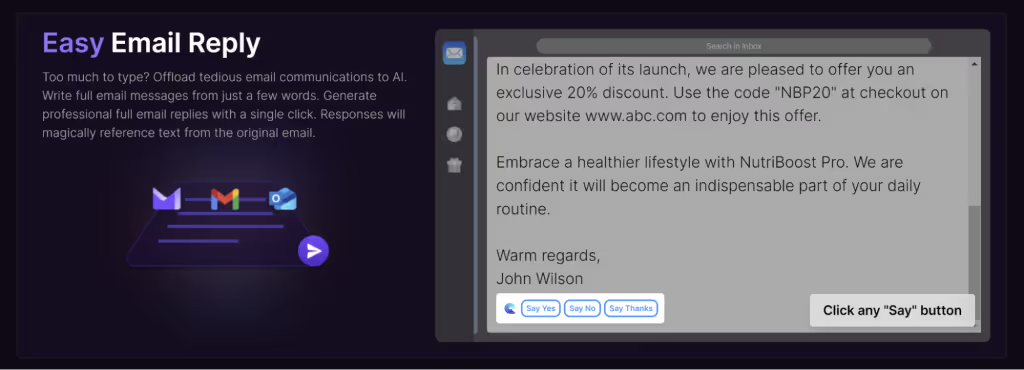
Compose AI is an email assistant that enhances writing efficiency by integrating directly into your email client. It uses AI to offer real-time suggestions, auto-completes your sentences, and tailors responses based on the context of your emails. Compose AI aims to boost productivity by reducing the time spent on writing and improving the quality of communication.
Key Features
- Real-Time Writing Assistance: Provides grammar corrections, style suggestions, and tone adjustments as you type.
- Contextual Content Generation: Generates relevant responses and content based on the email context.
- Seamless Integration: Works within popular email platforms without needing a separate interface.
Pros
- Saves significant time in email composition.
- Ensures that emails are not only grammatically correct but also appropriately toned.
- Easy to use, integrating directly into your existing email setup.
Cons
- Lacks advanced inbox sorting, team collaboration, and automation capabilities.
- As with any AI tool, the quality of suggestions can vary.
- You may need time to adapt to automated suggestions.
Pricing
Compose AI offers three pricing tiers, all available with a 33% discount on annual billing. The Basic plan is free, providing limited AI-generated text and basic features. The Premium plan costs $9.99 per month, offering more extensive AI text generation and premium features. The Ultimate plan, at $29.99 per month, provides unlimited AI text generation and advanced features. An Enterprise option is available for teams needing multiple accounts, with details available upon contact.
User Ratings
G2: N/A
Capterra: N/A
11. Rytr: For Multilingual Email Content Creation
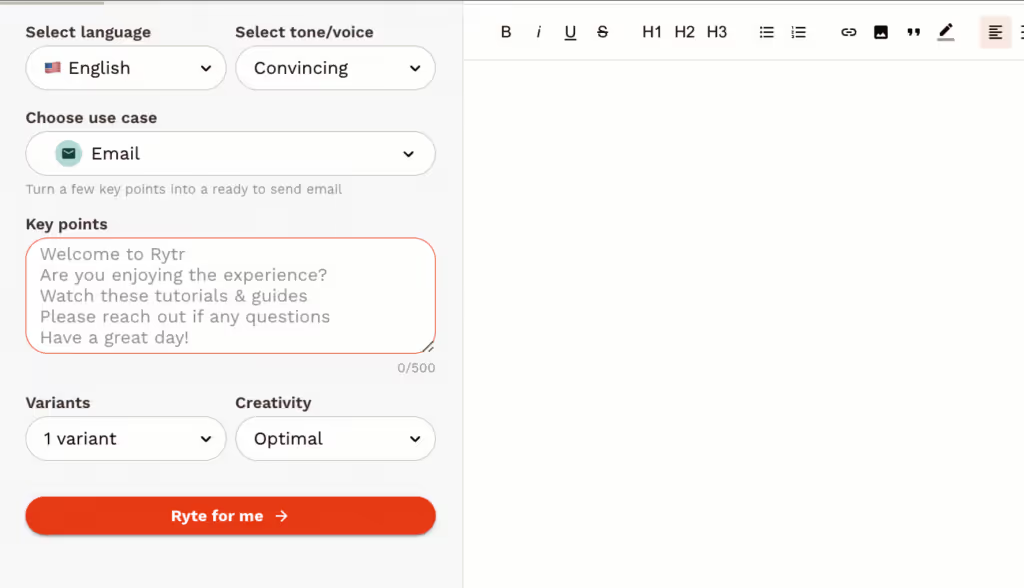
Rytr is an AI writing assistant that streamlines the email creation process. It employs advanced AI to generate diverse content types, from emails to engaging blog posts, making it a versatile tool for digital communication. Its AI Email Generator simplifies email creation by automatically crafting personalized and professional emails based on your tone of voice.
Key Features
- Multi-language Support: Crafts emails in over 30 languages, broadening your communication reach.
- Diverse Tone Settings: Offers over 20 different tones to match the specific style and sentiment of your brand or personal preference.
- Efficient Workflow: Quickly generates full-fledged emails from simple prompts or keywords, enhancing productivity.
Pros
- Suitable for a wide range of professional interactions.
- Reduces the time spent on drafting emails.
- User-friendly interface with simple steps to generate content.
Cons
- While efficient, Rytr's generated emails can sometimes feel too generic or lack a personalized touch, which may require manual adjustments.
- Lacks advanced features beyond writing emails.
Pricing
Rytr offers a flexible pricing structure with a free plan and several paid options. The free plan allows basic content generation with a character limit. The Unlimited plan, at $9 per month, provides unlimited character generation, suitable for individual users. The Premium plan, at $29 per month, is geared towards freelancers needing to create content for multiple brands and includes additional features like more extensive tone matching and increased plagiarism checks.
User Ratings
G2: 4.7/5 (806 reviews)
Capterra: 4.6/5 (18 reviews)
12. Warmer.ai: For Personalized Cold Email Campaigns
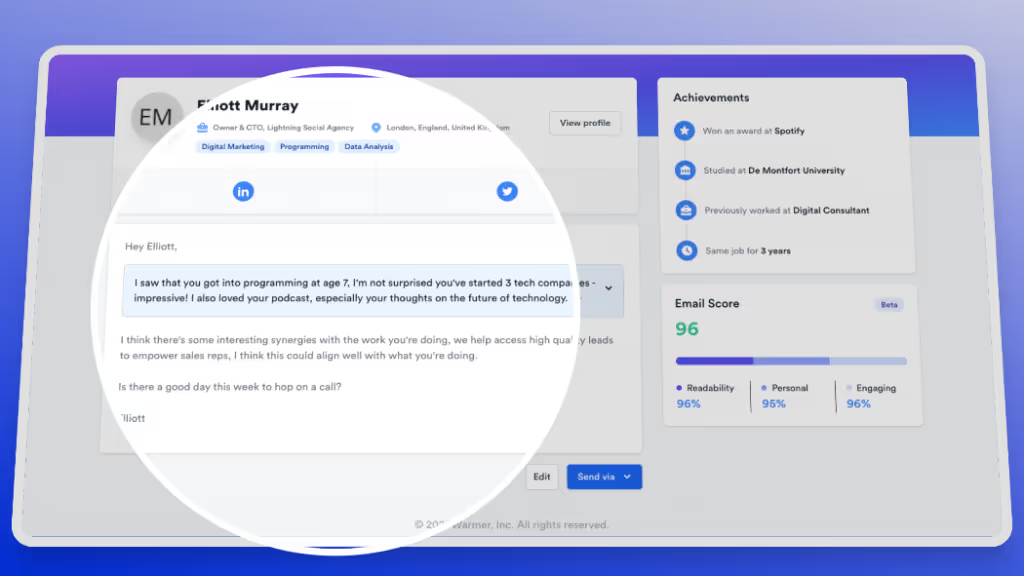
Warmer.ai specializes in enhancing cold email campaigns by utilizing AI to generate highly personalized emails. It's designed to analyze recipient data like LinkedIn profiles or websites to craft customized messages that increase engagement and response rates.
Key Features
- Prospect Analysis: Uses AI to analyze detailed prospect information for personalization.
- Objective-Oriented Templates: Allows users to select email objectives to tailor content accordingly.
- Rapid Personalization: Generates personalized emails in seconds.
Pros
- Quickly personalizes emails to boost response rates.
- Simplifies the email personalization process.
- Suitable for various marketing and sales objectives.
Cons
- Focused only on personalization, lacking all other features.
- Supports content generation in English only.
Pricing
Undisclosed.
User Ratings
G2: N/A
Capterra: N/A
13. Grammarly: For Comprehensive Writing Assistance Across Platforms
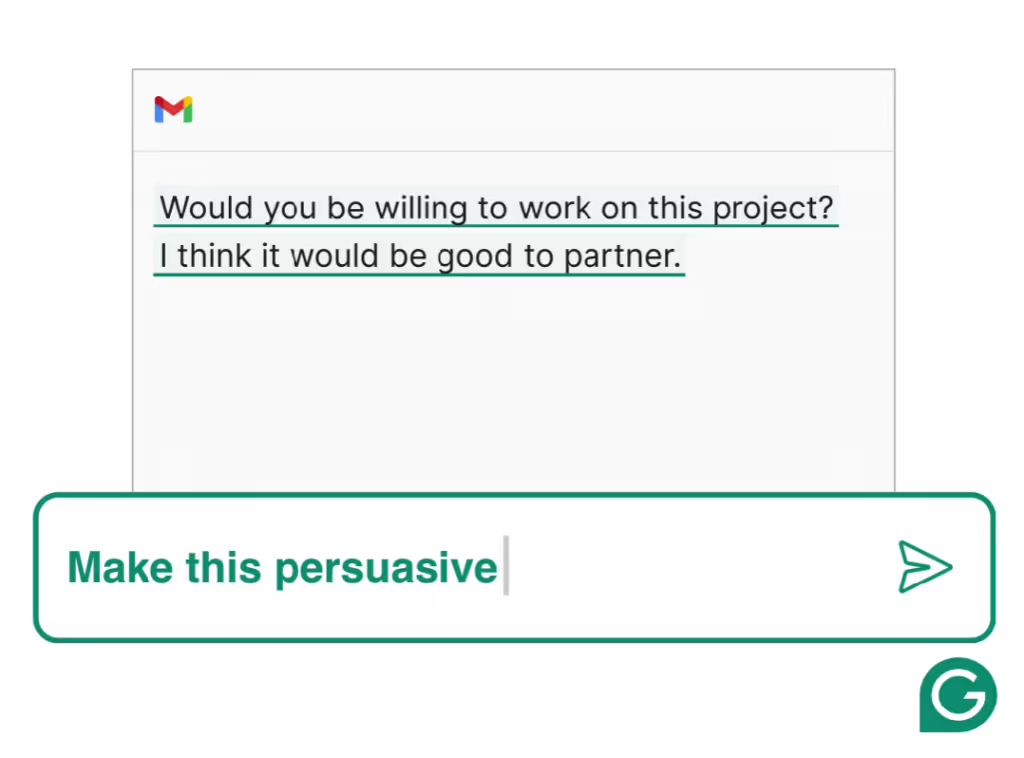
Grammarly is a comprehensive AI writing and spell-checking tool that enhances clarity, correctness, and communication effectiveness in writing across various platforms, including email. It enables clearer and more personable email writing for both personal and professional use.
It analyzes your content and provides grammatical corrections for spelling and punctuation mistakes, as well as tips to improve the style of your writing. With the premium version, Grammarly helps in enhancing the readability of your emails, too.
Key Features
- Advanced Grammar Checker: Corrects grammatical errors and enhances sentence structure in your emails.
- Tone Detection: Analyzes and suggests adjustments to convey the intended tone.
- Contextual Spelling Correction: Recognizes and corrects misspelled words based on context.
Pros
- Integrates with most writing platforms, including email clients, word processors, and web browsers.
- Offers suggestions as you type, improving email writing efficiency.
- Provides detailed explanations for corrections, aiding learning.
Cons
- Advanced features require a paid subscription.
- Often suggests unnecessary changes that miss the context.
- The browser extension has limited features.
Pricing
Grammarly offers a free plan that includes basic writing checks and a Pro plan at $12 per month (billed annually), which offers advanced features like full-sentence rewrites and tone adjustments. An Enterprise plan is also available for larger organizations, which includes additional team management features and dedicated support.
User Ratings
G2: 4.7/5 (8,598 reviews)
Capterra: 4.7/5 (7,102 reviews)
14. SmartWriter: For Personalized Outreach and Sales Email Automation
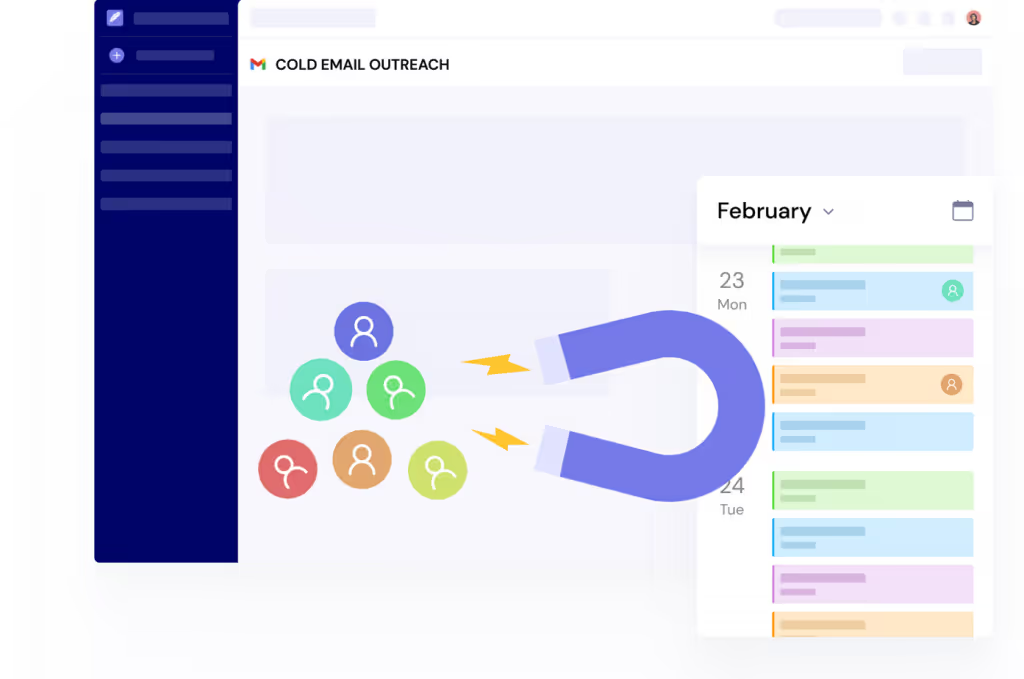
SmartWriter is an AI email assistant that specializes in personalizing outreach efforts, particularly useful for email and content marketing. It leverages data from various online sources to craft tailored messages that resonate with recipients, enhancing engagement and response rates.
It’s geared mainly toward cold emails and contextual pitches for sales or backlinks, but you can also use it to write personalized icebreakers, social media comments, LinkedIn requests, and Google/Facebook reviews.
Key Features
- Deep Personalization: Crafts emails using details from LinkedIn profiles, company websites, and other public information.
- Automated Research: Speeds up the outreach process by automating the research needed for personalized emails.
- Automated Follow-ups: Schedules and sends follow-up emails to increase conversion rates.
- Integration Capabilities: Seamlessly integrates with CRM systems to enhance workflow.
Pros
- Increases reply rates by using tailored content.
- Reduces the time spent on manual research and email drafting.
- Efficiently manages large volumes of outreach without compromising on personalization.
Cons
- The effectiveness of personalization depends on the accuracy and comprehensiveness of data.
- Requires technical expertise to fully integrate and utilize all features.
- Works well for cold outreach but not much besides it.
- Expensive, with no AI email assistant free plan.
Pricing
SmartWriter offers a range of subscription plans for its personalized email and outreach services. The Basic Plan is available for $59 per month, offering features like personalized lines per lead and LinkedIn outreach. The Popular Plan costs $149 per month, increasing the number of leads and adding more personalization capabilities. For larger teams, the Pro Plan at $359 per month offers extensive leads and full access to all AI tools. Each plan provides a 7-day free trial.
User Ratings
G2: 4.0/5 (10 reviews)
Capterra: N/A
Best AI Email Assistant: What Capabilities Should You Look For?
Given all the possibilities that AI can enable in email, simply integrating a generative-AI-based ChatGPT wrapper that helps you write emails wouldn’t exactly be the best AI email assistant.
Rather, the best AI email assistant tool should be your sidekick in tackling your daily routine with greater efficiency, freeing up your time to do important things outside of email.
“Honestly, it depends on what you need most. For me, I’d look for something that can prioritize emails and highlight key messages without missing anything critical. Oh, and it has to learn from my habits—who I reply to quickly, my tone, all of that. Bonus points if it integrates with my calendar, note-taking app, or a messaging platform like Slack if that’s for work,” remarks Oleksii Ianchuk, Mailtrap’s Product Lead.

“When choosing an AI email assistant, it’s important to focus on features like answer and resolution rates, as they determine how effectively it can handle email queries. Since emails are often viewed as a more formal and official form of communication, the AI software should be both confident and cautious in its responses. This means providing accurate and well-considered answers while avoiding errors or miscommunications that could affect the perception of professionalism and trust,” suggests Andre Braga, Senior Product Manager at Tidio.
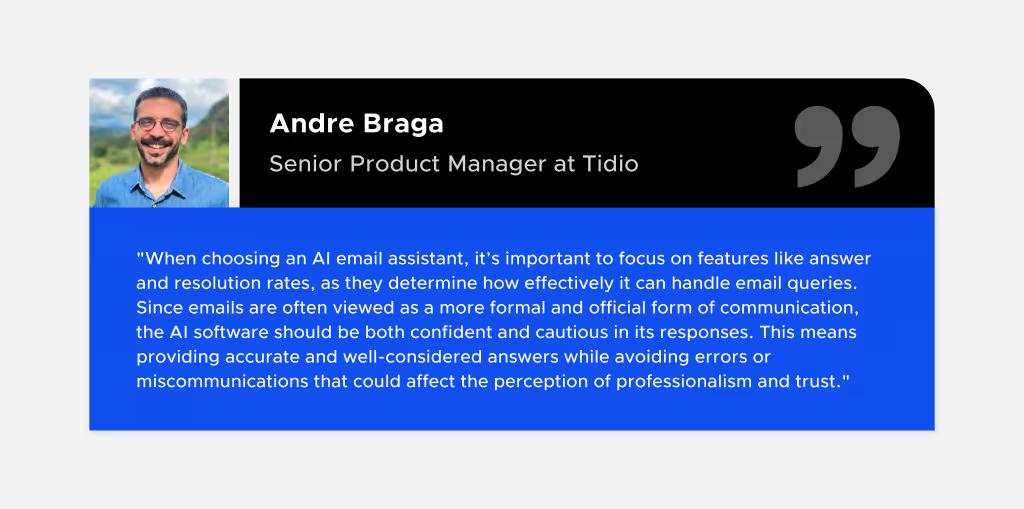
Here’s a quick look at the best AI email assistants you can pick from based on your primary needs.
Key Features to Consider in Your AI Email Assistant
Here are some of the crucial criteria you can consider when selecting the best AI email assistant:
- AI Capabilities: Assess the assistant's ability to understand context, personalize communications, and automate responses effectively.
- Drafting and Editing: Generates and refines email drafts using natural language processing (NLP).
- Quick Replies: Suggests context-appropriate responses to streamline communication.
- Summarization: Condenses information from long emails for quick comprehension.
- Sentiment Analysis and Intent Detection: Identifies the tone and purpose of incoming messages to facilitate appropriate responses.
- Automatic Labeling and Data Extraction: Organizes emails by categories and extracts key data for easy access.
- Email Integration: The AI email assistant should integrate flawlessly with popular email services such as Gmail, Outlook, and Zoho Mail, ensuring that you can maintain your existing workflows without the need for extensive reconfiguration.
- Inbox Management Features: Look for how the tool helps prioritize emails, sort messages, and clean up your inbox efficiently.
- Email Filters: Lets you sift through emails based on urgency and relevance.
- Scheduling and Snoozing: Allows you to manage when emails are sent or when they should reappear in your inbox.
- Bulk Cleaner and Unsubscribe Tools: Helps maintain a clean inbox by managing subscriptions and removing bulk emails.
- Read Receipts: Tracks when emails are opened, providing insights into recipient engagement.
- User Experience: The interface should be intuitive and easy to navigate, enhancing rather than complicating your email tasks. It should ideally have a little-to-no learning curve and boosts your productivity instantly through a well-designed layout.
- Data Privacy and Security: Data protection is paramount. Look for AI email assistants that comply with major regulations like GDPR and HIPAA, utilize robust encryption methods to secure data transmission, and employ secure data storage practices.
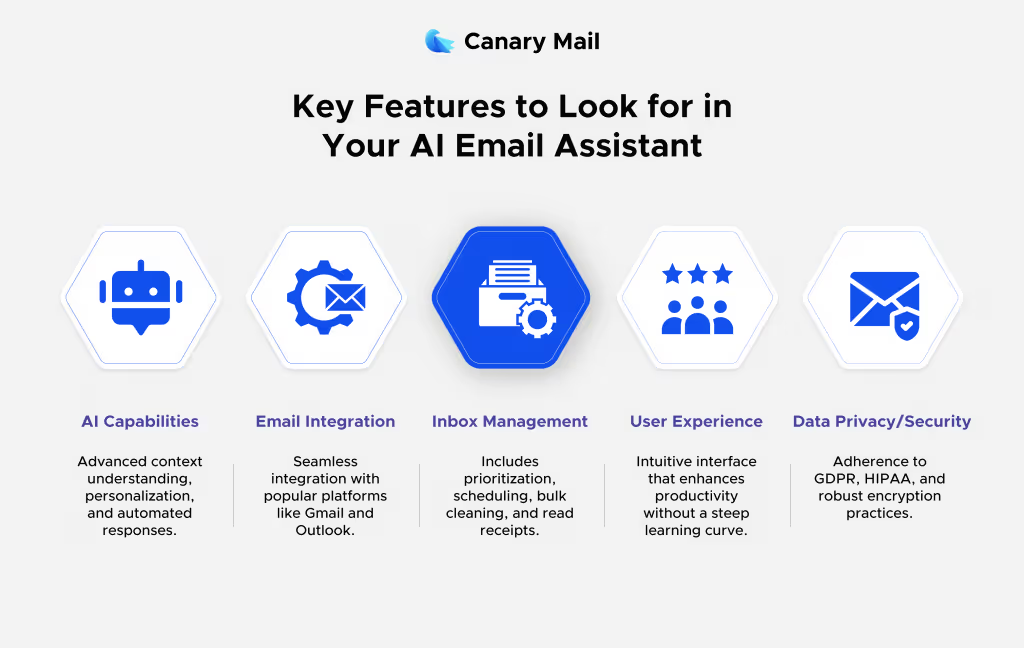
For executives, choosing the best AI email assistant is really all about boosting efficiency.
“Admittedly, I’m pretty old school when it comes to my personal email. I triage, reply when needed (which isn’t often, let’s be fair), and move on,” says Scott Cohen, InboxArmy’s CEO.
He further explicates what fast-paced professionals should look for when choosing an AI email assistant.
“From my ‘focus group of one,’ here’s what I’d look for in an AI email assistant:
- Enhanced/automatic triaging. I’m terrible at building folders and categorizing things. Having something like Gmail tabs but ‘on steroids’ would be amazing. And the ability to automatically block or at least filter the mountains of cold email I get would be a breath of fresh air.
- Improved security and privacy. Did you know that 99% of email already gets blocked by spam filters? Think of how much email you get in that 1%. Having even better filtering at the personal user level is great.
- Grammar and style editing. I write my own emails. I’m a former copywriter, so getting away from that fully would be tough. That said, as a recent Apple Intelligence commercial pointed out, the ability to ‘zhuzh’ your copy depending on style choice or recipient could be incredibly useful.
- Easy scheduling. Sometimes, my best ideas come at night, but I don’t want to bother my team. Having the ability to write and snooze send times would be great.
- Summarization. I’m a CEO. I need bullet points. Tell me what I need to do.”
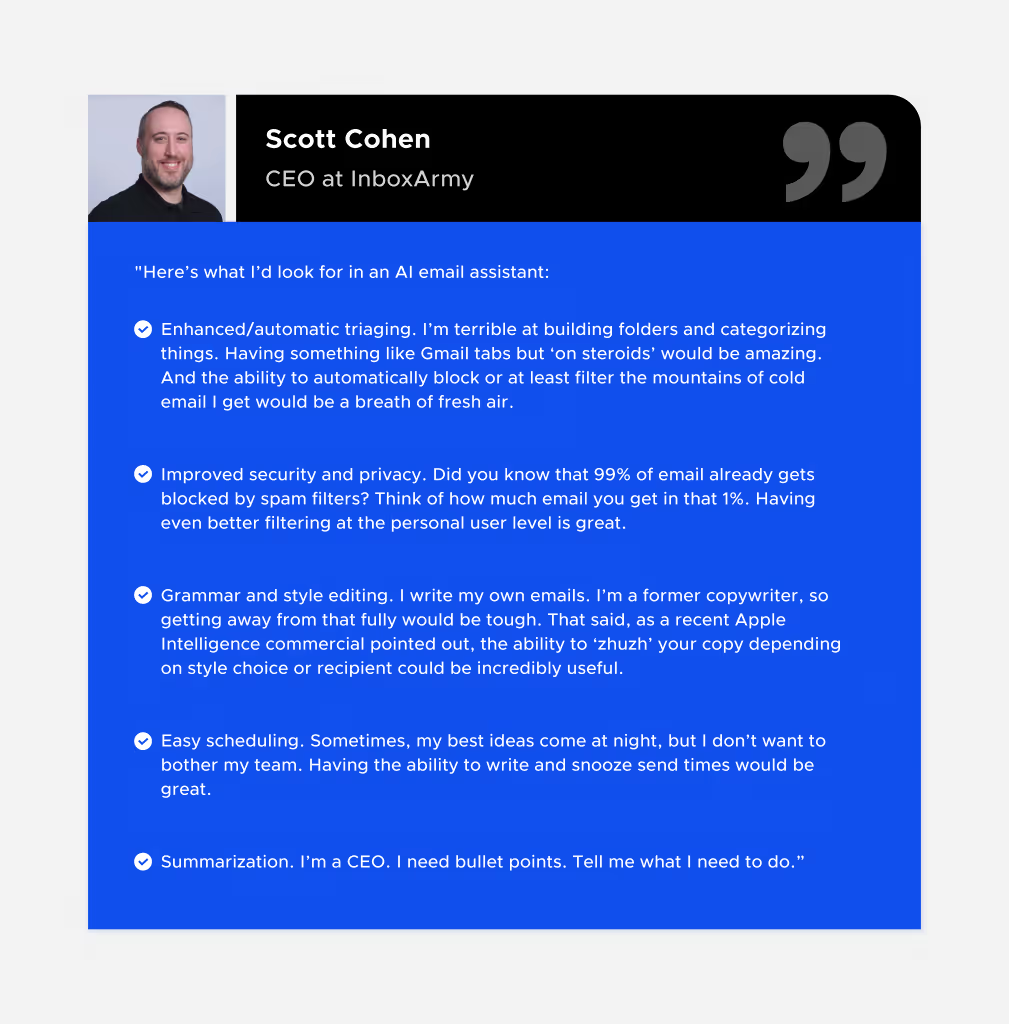
Canary Mail: The Best AI Email Assistant for the Biggest Productivity Boost
Not to toot our own horn, but Canary Mail ticks nearly all of these essential boxes for effective email management. With robust AI capabilities including drafting, quick replies, and summarization, it integrates smoothly with popular email services. Canary offers a clean UX through an intuitive interface and prioritizes data security with HIPAA, GDPR, and Google's Limited Use Requirements, making it a fine choice if you’re seeking the best AI email assistant tool.
Best AI Email Assistant: Take Your Pick
The right AI email assistant can significantly enhance your productivity and email management. It can streamline communication by automating responses, organizing inboxes, and ensuring your messages are clear and correctly tailored to the recipient. With a focus on efficiency and security, AI email assistants can transform your email encumber into a more manageable and less time-consuming part of your day.
Ready to experience the benefits for yourself? Download Canary Mail for free and see how it can upgrade your email workflow.
Best AI Email Assistant: FAQs
What is an AI Email Assistant?
An AI email assistant automates and enhances various email tasks using artificial intelligence. The best AI email assistants can draft, sort, and respond to emails based on learned preferences and rules, making email management more efficient.
Which is the best AI email assistant available today?
Canary Mail out as the best AI email assistant app due to its extensive feature set, in addition to advanced security measures, seamless integration, and user-friendly interface, making it a top choice for both personal and professional use.
Can AI email assistants ensure privacy and security?
Yes, modern AI email assistants prioritize user privacy and security. The best AI email assistant tool, like Canary Mail, complies with major data protection regulations such as GDPR and use end-to-end encryption to safeguard data.
How can I set up an AI email assistant on my email account?
Setting up an AI email assistant typically involves downloading the software and/or integrating an extension or plugin with your existing email client. Follow the specific instructions provided by your choice of AI email assistant to set it up correctly.
Can I train the AI to suit my specific email handling needs?
Yes, the best AI email assistants allow customization and learning from user corrections and preferences, enabling the AI to better suit your individual email management styles over time.
What is the best AI assistant for Outlook?
Canary Mail enhances Outlook by adding sophisticated AI email management tools that automate and optimize email handling, making it a top choice for Outlook users.
Is there an AI for Gmail?
Canary Mail seamlessly integrates with Gmail, enhancing its functionality with advanced AI tools that simplify email management and automate mundane tasks.
What is the best AI for emails?
Canary Mail is highly effective in managing email workflows through AI, providing tools for scheduling, organization, and personalization that streamline daily email tasks.
What is the best AI tool that can write emails in my style?
Canary Mail excels at learning users' writing styles and preferences, allowing the AI to craft emails that closely mimic the user's natural tone and style, enhancing personalization.
Which is the best AI Email assistant app?
Canary Mail is widely appreciated for its comprehensive AI capabilities that cater to a broad range of email management needs, making it one of the best on the market. It stands out for its user-friendly interface and powerful AI-driven functionalities that enhance email management, making it ideal for individuals and businesses looking to streamline their communications.
Is there a free AI that writes emails?
Canary Mail offers a basic free version that includes AI-driven email writing assistance, ideal for users needing to enhance their email efficiency without a financial commitment.
Does an AI email assistant exist?
AI email assistants like Canary Mail are transforming email management by automating sorting, prioritization, and response generation, significantly reducing the manual effort involved in handling large volumes of emails.
Any AI that is good at generating emails?
Canary Mail is adept at generating accurate and contextually relevant emails quickly, leveraging AI to understand content requirements and craft responses that align with user intents.